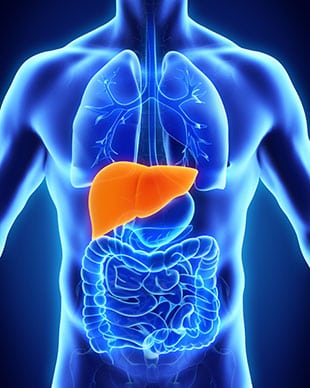When we talk about the circadian rhythm, most people think about the brain. However, every organ has its own internal biological clock. The liver’s innate 24-hour rhythm is especially important to your metabolism and even affects the central circadian clock in your brain. New studies suggest that the liver’s circadian clock may even regulate hunger, digestion and a variety of human behaviors.
Your Liver: A Key Part of Metabolism
The liver is the largest organ in the human body and also one of the most multifunctional ones. It plays a variety of important roles necessary for daily life. The liver is technically considered a gland due to its active secretion of a variety of important hormones that regulate metabolism. In addition, the liver detoxifies the blood, regulates glucose balance, breaks down red blood cells and produces a variety of proteins and vitamins. When the liver can no longer function properly, a person will quickly die unless they can get a transplant.
Many of the activities of the liver occur constantly or in response to environmental cues. However, some of these functions, especially metabolic activities, occur on a distinct cycle determined by a circadian clock in the liver itself. This internal clock appears to be in constant communication with pacemakers in our brains, potentially affecting a wide range of functions and behaviors.
The Role of the Circadian Clock in the Liver
 When you travel more than a time zone away, you may suffer from jet lag and disrupted sleep. Many travelers notice that they are hungry at odd times as well. It may surprise you to learn that this is due to the presence of a circadian clock in the liver. This clock regulates, among other things, the times when you are hungry. The liver releases hormones that make us hungry along with important enzymes for digestion just before the times when we normally eat.
When you travel more than a time zone away, you may suffer from jet lag and disrupted sleep. Many travelers notice that they are hungry at odd times as well. It may surprise you to learn that this is due to the presence of a circadian clock in the liver. This clock regulates, among other things, the times when you are hungry. The liver releases hormones that make us hungry along with important enzymes for digestion just before the times when we normally eat.
The presence of a circadian clock governing hunger and digestion was confirmed in a recent study of rats. Rats express certain genes related to circadian rhythm periodically, and this gene activity correlates with hunger and release of digestive enzymes. When fed only at certain times, the expression of these genes slowly changed to mimic the new feeding schedule. This is similar to the behavior of circadian rhythm genes that govern the sleep-wake cycle; people can gradually change their bedtimes or wake up times. Furthermore, this study found that there is a great deal of communication between the circadian clocks of the brain and those of the liver, presenting a possible mechanism for the Zeitgeber effect of food.
Liver, Brain, and Circadian Rhythm
It is exciting to find confirmation of previous studies concluding that the timing of food intake can affect the body’s circadian rhythm. In addition, these new findings are promising when it comes to finding new treatment possibilities for people who struggle with obesity, diabetes and other diseases that are affected by both liver function and the circadian rhythm. More effective treatment can result when people take their medications at the time of day when they will be most effective, or at times when the cell receptors that these medications target are most active. In addition, while there still needs to be more study in this area, the current body of evidence suggests that eating late at night may be detrimental to people who have sleep disorders.
Discovering the biochemical foundation of the circadian clock in the liver opens new avenues for study. Every organ appears to have its own internal clock, but that of the liver seems especially important in regulating metabolism and overall well-being. Understanding how our bodies work is always a first step to finding new and more effective medical treatments.


